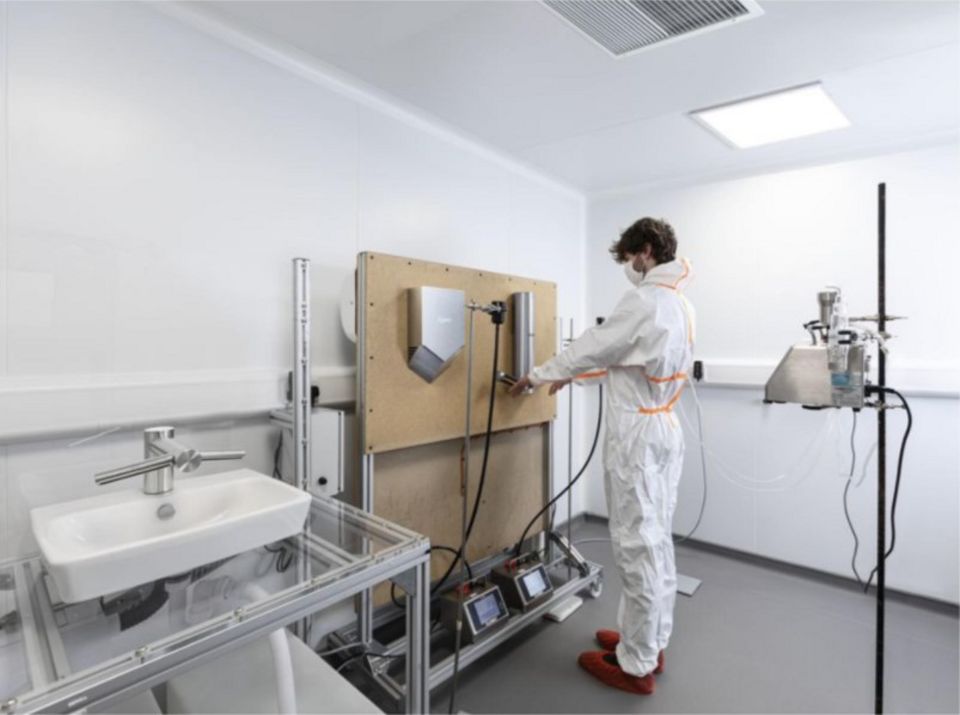
With people returning to the workplace, Dyson technology provides a safe, touch-free and hygienic solution for restrooms around the world
After almost a year of working remotely during a global pandemic and some employees returning to the workplace, with a keen focus on staying safe, and a demand for healthy and hygienic workspaces, including shared spaces such as restrooms.
16 June 2021
It is estimated that we spend one third of our adult life at work1 and in today’s climate it is vital that hygienic, touch-free hand washing and drying solutions are available in workspaces to help control the spread of germs. All Dyson Airblade™ hand dryers have HEPA filtration – proven to capture 99.95% of particles2 as small as 0.1 microns, including bacteria and viruses3, from the restroom air that pass through the filter. Meaning they dry your hands with HEPA-purified air, not dirty air. They are also touch-free, and with our latest hand drying technology the Dyson Airblade 9kJ, engineered with time-of-flight sensors which activate in 0.25 seconds to deliver HEPA-filtered air. This overcomes the problems faced by some paper towel dispensers and button-based hand dryers, and are up to 99% less expensive to run than paper towels4 with up to 85% less CO2 emissions5. And as Dyson Airblade™ hand dryers don’t use nasty consumables it also means the restroom can be free of overflowing bins and soiled paper towels strewn across the floor which could harbor bacteria and viruses.
It’s clear that they are a safe, cost efficient and hygienic solution for any restroom and provide peace of mind for employees going back to shared working spaces – at a time when hygiene is of paramount importance and futureproofing the workplace with safe and hygienic technology is top of mind.
“This global pandemic is the greatest crisis of modern times, and it has fundamentally changed the way we work and our approach and attitudes to hygiene,” says Alex Knox, Dyson VP of Environmental Care. “Keeping shared spaces clean has never been so important and we all want to touch things less. We’ve developed a fast, hygienic and touch-free way to dry hands, which comes without the cost and environmental concerns associated with papers towels. Our Dyson Airblade™ hand dryers also feature HEPA filters that capture 99.95% of particles2 as small as 0.1 microns, including bacteria and viruses3, to dry your hands with clean air, not dirty washroom air.”
Indeed, in a global hygiene study6 in July 2020, Dyson examined how attitudes towards the washroom and general hand hygiene have changed since COVID-19 started. The study revealed that poorly maintained washrooms caused people concerns:
- 48% worrying about having to press buttons on hand dryers to use them
- 61% selected touchless activation of a hand dryer as one of the features that would put their mind at ease if using a hand dryer
- 52% stated that hand dryers with filters, which clean the air would also make them feel more confident when drying their hands with a hand dryer.
“We know damp hands can transfer up to 1000 times more bacteria than dry hands” 7, says Salome Giao, Senior Researcher at Dyson. “We wanted to ensure that people are washing and drying their hands properly and dispel any myths around aerosolization and hand dryers,” she explains. “Not having a drying option in a washroom due to misinformation can increase the spread of germs and is ultimately unhygienic,” she adds.

What is Aerosolization?
Aerosolization is the emission or creation of liquid or solid particles, or a mix of both that are suspended in air. Depending on the size and other factors they will stay longer in the air or will settle quicker. For example, 10 microns aerosols could take a few minutes to settle while aerosols smaller than 0.3 microns might never settle. The time of settling increases with the decrease of the size of the aerosol.
What is the study and what does it mean for workers?
This new research supports that the Dyson Airblade™ is a safe and hygienic way to dry your hands.
In this independent study, the objective was to determine the effect of the different hand drying methods on concentration of aerosols and bacteria in air. To do so, the study compared hands rinsed with water (no soap) or washed with soap for 20 seconds and then dried either using Dyson Airblade™ hand dryers or paper towels.
-

-
Airblade™ washrooms in Singapore
Workplaces in Singapore such as DBS Asia Hub, Revenue House, Frasers Tower, Keppel Bay Tower and SMRT Bishan Depot have Dyson Airblade™ hand dryers installed in their washrooms to provide a touch free, hygienic, and sustainable hand drying experience.
[1] World Health Organization, Occupational Health Global Strategy.
[2] HEPA filter tested to EN1822-5, by an independent testing laboratory, under prescribed test conditions.
[3] Tested by an independent laboratory, under prescribed test conditions, using the bacteria Brevundimonas diminuta and the virus MS-2 coliphage.
[4] Average electricity price US$0.1/kWh as of May 2019. For calculations visit www.dyson.com.sg/calcs
[5] The environmental impact of electrical appliances and paper towels was measured by Carbon Trust. The calculations were produced using the software Footprint Expert Pro, based on product use over 5 years and using weighted averages of individual countries of use. Dry times for product were evaluated in Max mode using DTM 769.
[6] Global survey conducted in July 2020 across 14 countries worldwide (UK, DE, ES, FR, IT, NL, US, CA, MX, CN, JP, MY, SG, AU) with 8758 respondents in total (561 in Singapore), aged 18 years-old or above. Individual percentages vary per country.
[7] D. R. PATRICK, G. FINDON and T. E. MILLER: Residual moisture determines the level of touchcontact associated bacterial transfer following hand washing, Epidemiol. Infect. (1997): 119, 319-325.
Yvette Yeo
Email:yvette.yeo@dyson.com
